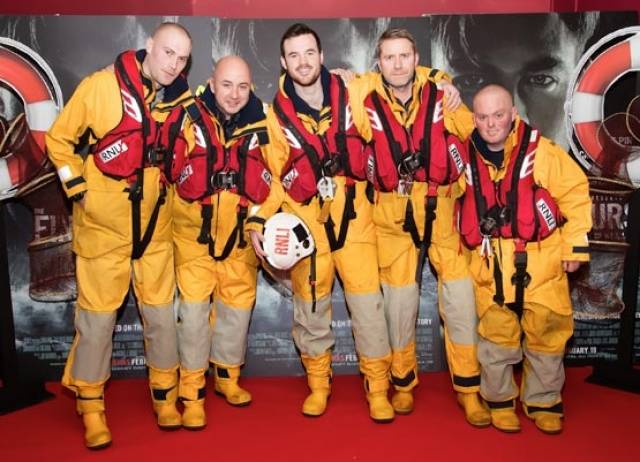#RNLI - Volunteer lifeboat crew from three RNLI stations in Dublin were in Dundrum on Wednesday evening (17 February) for the Irish gala screening of Disney's latest action film The Finest Hours.
Volunteers Gerry Canning and Eoin Kelly from Skerries RNLI, Manus O’Donnell from Howth RNLI and Paul Cummins and Jack Shanahan from Dun Laoghaire RNLI were invited to swap lifeboats for the limelight as they shared the red carpet with guests at the high-action movie premiere at Dundrum Town Centre.
The film tells the incredible true story of the heroic 1952 SS Pendleton rescue mission carried out by the US Coast Guard which is still regarded as one of the greatest sea rescues of all time.
The Finest Hours is based on the acclaimed non-fiction book of the same name by Michael J Tougias and Casey Sherman, which tells the tale of true events that took place 64 years ago this week.
Presented in Digital 3D and IMAX 3D, the film will transport audiences to the heart of the action, creating a fully-immersive cinematic experience on an epic scale.
Owing to the long and close relationship that the RNLI holds with the US Coast Guard, it was highly appropriate for Disney and the RNLI to work together in Ireland, while helping to raise awareness of the charity’s lifesaving work.
The Dublin crew, dressed in full all-weather lifeboat kit, ushered guests to their cinema seats where ahead of the movie, they watched a hard-hitting advertisement from the RNLI’s national drowning prevention campaign, Respect the Water.
The campaign which was first launched last summer warns people that coastlines and waters can be dangerously unpredictable.
The 60 second commercial entitled ‘Breathe’ is shown from the point of view of the casualty, played by an actor. The narrator Andy Serkis invites the audience to hold its breath while watching the film, as the casualty struggles and succumbs to the effects of cold water shock in the time the audience is holding their breath.
The film reveals that, on land, the average person can hold their breath for 45 seconds – but in cold water, they might not last 10.
Speaking following the gala screening, Gerry Canning from Skerries RNLI said: "It was great to see such strong parallels between the bravery, selflessness and community spirit shown by the characters in the film which is mirrored by RNLI lifeboat crew all around Ireland.
"It’s not unusual for us to be woken up by our pagers on a normal week night, so an evening of glitz and glamour was a nice change."
In 2015, RNLI lifeboat crews – who are on-call 24/7, 365 days a year – launched 1,098 times rescuing 1,244 people.
The RNLI has been operating since 1824 and has continually shared expertise, advice and training knowledge with the US Coast Guard for over 100 years.
RNLI volunteers also attended gala screenings of the film in Galway, Cork and Limerick last night.
The Finest Hours will open in Irish cinema today (Friday 19 February). Watch the trailer below.
































































